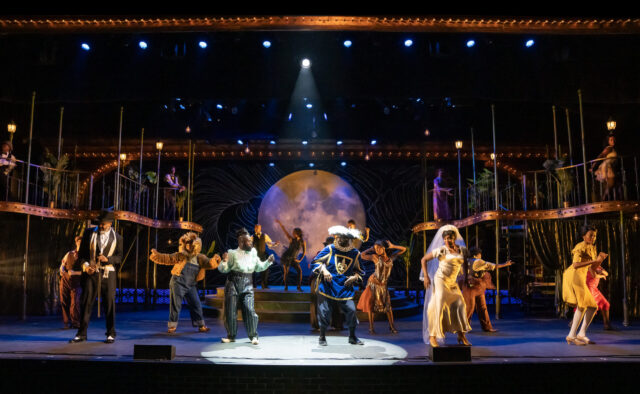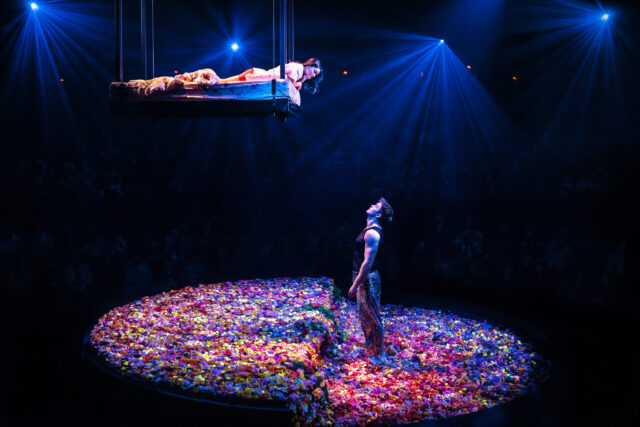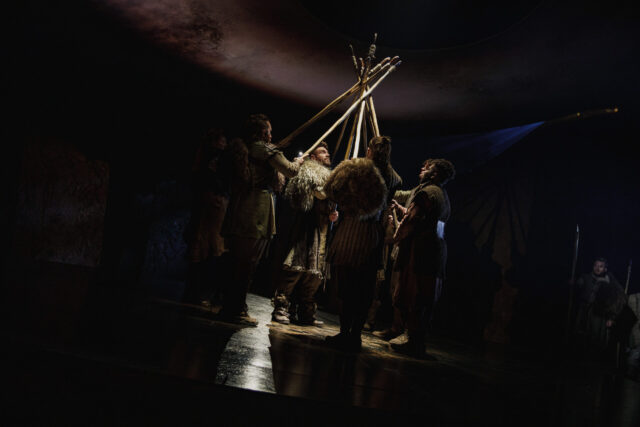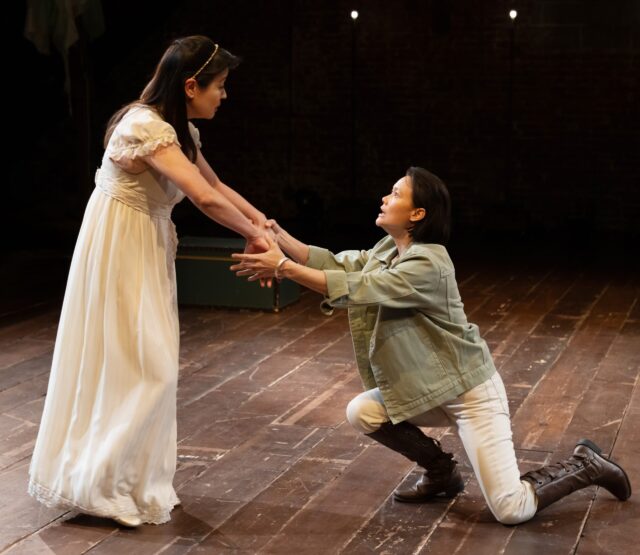
The pure and passionate love between Princess Imogen (Jennifer Lim) and Posthumus Leonatus (KK Moggie) is challenged in NAATCO’s Cymbeline (photo by Julieta Cervantes)
CYMBELINE
Lynn F. Angelson Theater
136 East Thirteenth St. between Third & Fourth Aves.
Tuesday – Sunday through February 15, $25-$55
https://www.naatco.org
“Context is everything,” according to a phrase attributed to twentieth-century sociologist Alvin Ward Gouldner, author of such books as The Coming Crisis of Western Sociology and Against Fragmentation: The Origins of Marxism and the Sociology of Intellectuals.
That expression was on my mind as I watched the National Asian American Theatre Co.’s (NAATCO) splendid production of William Shakespeare’s Cymbeline, running at the Lynn F. Angelson Theater through February 15.
When I saw Heidi Schreck’s What the Constitution Means to Me at New York Theatre Workshop in 2018, it was the day that the Judiciary Committee had voted to advance the nomination of Brett Kavanaugh for Supreme Court Justice to the Senate floor. The air was thick with that event, which Schreck shrewdly noted without getting specific, but the entertaining show soon had the audience laughing.
I saw Cymbeline the day I learned that President Donald J. Trump had signed an executive order declaring, “It is the policy of the United States to recognize two sexes, male and female. These sexes are not changeable and are grounded in fundamental and incontrovertible reality. . . . Agencies shall remove all statements, policies, regulations, forms, communications, or other internal and external messages that promote or otherwise inculcate gender ideology, and shall cease issuing such statements, policies, regulations, forms, communications or other messages.”
Andrea Thome’s modern-verse adaptation, which identifies itself as “all-femme, all–Asian American,” feels like a punch to the gut of that executive order, which essentially seeks to ban the word “gender” from the English language. It is particularly relevant in a work by Shakespeare, since original productions of his plays featured all-male casts because women were not permitted to perform onstage in Elizabethan times. , as it was considered unladylike and demeaning to their established role in Victorian society.
In Ancient Britain, King Cymbeline (Amy Hill) has banished Posthumus Leonatus (KK Moggie), a soldier who has wed his daughter, the princess Imogen (Jennifer Lim), without royal permission, ignoring their deep love for each other. The queen (Maria-Christina Oliveras) is determined that her son from a previous marriage, Cloten (Jeena Yi), will be Imogen’s husband, ensuring he will be the next ruler.
In exile in Rome, Posthumus boasts to a group of men from Italy, the Netherlands, Spain, and France about his true love’s undying fidelity. The Frenchman tells the doubting Iachimo (Anna Ishida) of a conversation he had with Posthumus the night before in which they both were “lavishly praising our beloved mademoiselles back home; this gentleman at the time vouching (and vowing to defend it with his blood) that his lady was more lovely, virtuous, wise, chaste, faithful, praiseworthy and less temptable to seduction than any of the most extraordinary ladies in France.”
Iachimo takes that as a challenge and offers half his estate against Posthumus’s diamond ring, which belonged to Imogen’s mother, that he can seduce the princess and bring back absolute proof of his success. “The goodness of my mistress exceeds the depth of your vulgarity. I dare you to this match,” Posthumus says, agreeing to the bet and adding that they will duel when Iachimo fails.
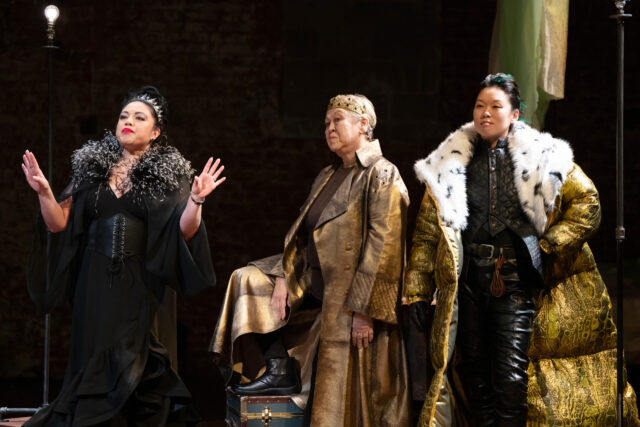
Cymbeline features an “all-femme, all–Asian American” cast (photo by Julieta Cervantes)
Even though Imogen boldly rejects Iachimo’s advances, he tricks Posthumus into believing that the princess did indeed surrender her honor, prompting Posthumus to write to Imogen advising her to meet him in the Welsh town of Milford Haven and commanding his loyal servant, Pisanio (Julyana Soelistyo), to kill her because of her adultery. “Do I seem to the world to lack humanity so much as this crime asks?” Pisanio says, questioning the order.
In addition, the foolish Cloten has decided that he too will head to Milford Haven, to kill Posthumus and “defile” Imogen on his path to becoming next in line for the throne.
Meanwhile, the Roman ambassador Caius Lucius (Purva Bedi) has threatened King Cymbeline with war if he does not pay tribute tax to Augustus Caesar; the queen has acquired poison from the doctor, Cornelius (Narea Kang), that she intends to use on Imogen; and on her way to Wales disguised as a boy named Fidele, Imogen encounters a father and his two boys, who live in a cave, surviving on sheer will. Little does she know that it is actually Belarius (Oliveras), who was wrongly banished by Cymbeline many years before and who absconded with Arviragus (Annie Fang) and Guiderius (Sarah Suzuki), the king’s two young sons and her half brothers, who the ruler believes are dead.
The numerous subplots all come together in a rousingly satisfying finale.
Cymbeline is a problematic play that is far from the Bard’s finest. It feels cobbled together with leftovers from such other works as Twelfth Night, Romeo and Juliet, The Comedy of Errors, Richard III, Hamlet, and Othello. A dream sequence involving the god Jupiter (Soelistyo) is one of Shakespeare’s strangest, most awkward scenes. The dialogue lacks memorable, familiar lines. At nearly three hours (with intermission), it is too long. In New York City, the play has never made it to Broadway; the Public has presented it three times in its Shakespeare in the Park festival, in 1971, 1998, and, most recently, 2015, with Patrick Page as the king, Kate Burton as the queen and Belarius, Hamish Linklater as Posthumus and Cloten, Lily Rabe as Imogen, and Raúl Esparza as Iachomo.
But NAATCO, in partnership with Play On Shakespeare, has breathed new life into the show. Yi-Hsuan (Ant) Ma’s spare, often bare set is highlighted by a multipurpose large stretch of cloth that cleverly morphs from a bedsheet to royal drapery to a cave entrance, evoking what would be considered then women’s work, made by seamstresses. Mariko Ohigashi’s costumes feature lots of black leather and British and Roman finery that stand in contrast to the princess’s white gown. Yiyuan Li’s lighting keeps the audience, sitting on three sides of the action, visible through much of the show, as if we are all part of the kingdom, especially on the several occasions where the fourth wall is broken. Caroline Eng’s sound includes musical chimes that signal various changes.

The banished Belarius (Maria-Christina Oliveras) has raised Arviragus (Annie Fang) and Guiderius (Sarah Suzuki) in a cave in the woods (photo by Julieta Cervantes)
The majority of the cast is exemplary, ably emitting Shakespeare’s poetic iambic pentameter even when Thome’s contemporary translation uses modern language, although Bard purists should not be too worried.
Here is one example of Thome’s (Pinkolandia, A Dozen Dreams) style, with the Folger Library version first, followed by the new adaptation:
Cloten: Was there ever man had such luck? When I
kissed the jack, upon an upcast to be hit away? I
had a hundred pound on ’t. And then a whoreson
jackanapes must take me up for swearing, as if I
borrowed mine oaths of him and might not spend
them at my pleasure.
Cloten: Has there ever been a man with luck like mine? I’d bowled my
ball, just kissed the jack . . . and then was hit away! I had bet a
hundred pounds on that game: and then that damned monkey
son of a whore had to scold me for swearing.
It is important to point out that the ensemble is identified as “all-femme,” not “all-woman”; in real life, not all of the actors use the pronouns “she/her.” In addition, being “all–Asian American” is a strong rejoinder to the Asian and immigrant hate so pervasive in America today and apparently supported by the current administration, which is also seeking to subvert the fourteenth amendment by ending birthright citizenship and to deport Dreamers. Director Stephen Brown-Fried (Misalliance, Awake and Sing!), who does a terrific job guiding the proceedings, does not emphasize any of that, instead letting it all unfurl in an organic and natural way, gender be damned.
“I see a man’s life is a tedious one,” Imogen says in a soliloquy in Act 3, Scene 6, in front of the cave in the Wales forest.
In this wonderful adaptation in these troubled times, that statement speaks volumes.
[There are several special postshow events scheduled: January 29 is AAPINH Night, with a talkback with the director, members of the cast, and the casting company; February 2 is Shakespeare Trivia Night after the matinee; and the February 6 performance will be followed by the panel discussion “Shakespeare in Translation: Body and Verse,” with Lue Douthit, Karen Shimakawa, and Thome.]
[Mark Rifkin is a Brooklyn-born, Manhattan-based writer and editor; you can follow him on Substack here.]

